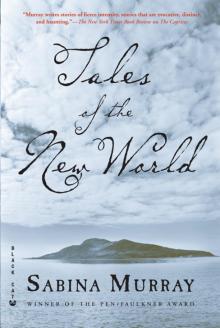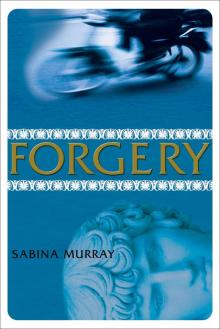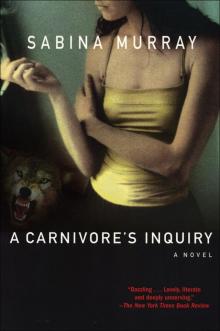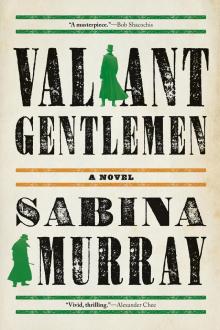- Home
- Sabina Murray
A Carnivore's Inquiry
A Carnivore's Inquiry Read online
Praise for A Carnivore’s Inquiry:
“Murray is a mesmerizing writer who uses succinct, evocative language with the precision of a pointilist.”
—Rene Rodriguez, The Miami Herald
“Though A Carnivore’s Inquiry has any number of scary (not to mention stomach-churning) moments, the novel’s real appeal lies in Katherine’s erudite, mordant humor.... Beneath both the humor and the horror lies a scathing indictment of American values. Katherine, with her ceaseless hunger, serves as a gorgeous, freaky metaphor for that clichéd American dream of having it all.”
—Joanna Smith Rakoff, Time Out New York
“Compelling, maddening, hilarious ... remarkable.”
—Ron Bernas, Detroit Free Press
“Stylish, chilling, highly literate psychological thriller.”
—The Bookseller (UK)
“Why is this book, full of murder, loneliness, and insanity, so darn funny? That’s the genius of this oddly wonderful and engrossing second novel by Murray. ... The plot itself is tight and fast, quirky and dangerous.”
—Anne Rochell Konigsmark, The Atlanta Journal-Constitution
“Mesmerizing ... Murray paces her psychological thriller with consummate control, keeping the reader enthralled through subtle suggestion and a scattering of grisly details. But the author has a darker purpose. More than the story of one deranged woman’s obsession, the novel and its brilliant subtext hint at the ways American society devours the weak, while building a case for a blood hunger in human nature. ... Readers will be hooked by Murray’s classy treatment of her sexy-sinister subject matter.”
—Publishers Weekly
Also by Sabina Murray
The Caprices
Slow Burn
A CARNIVORE’S INQUIRY
Sabina Murray
Copyright © 2004 by Sabina Murray
All rights reserved. No part of this book may be reproduced in any form or by any electronic or mechanical means, including information storage and retrieval systems, without permission in writing from the publisher, except by a reviewer, who may quote brief passages in a review. Any members of educational institutions wishing to photocopy part or all of the work for classroom use, or publishers who would like to obtain permission to include the work in an anthology, should send their inquiries to Grove/Atlantic, Inc., 841 Broadway, New York, NY 10003.
Published simultaneously in Canada
Printed in the United States of America
FIRST GROVE PRESS PAPERBACK EDITION
Library of Congress Cataloging-in-Publication Data
Murray, Sabina.
A carnivore’s inquiry / Sabina Murray.
p. cm.
eBook ISBN-13: 978-1-5558-4703-6
1. Young women—Fiction. 2. New York (N.Y.)—Fiction.
3. Mexico—Fiction. 4. Maine—Fiction. 5. Murder—Fiction. I. Title.
PS3563.U787C37 2004
813′.54—dc22 2003064615
Grove Press
an imprint of Grove/Atlantic, Inc.
841 Broadway
New York, NY 10003
For John
The inhabitants seem to live in that Golden World of which old writers speak so much, wherein men lived simply and innocently without enforcement of laws, without quarelling, judges and libels, content only to satisfy nature.
—Peter Martyr deAnghera, Decades de Orbe Novo
Why trembles honesty; and, like a murderer why seeks he refuge from the frowns of his immortal station?
—William Blake, America: A Prophecy
1
I am standing at the side of the highway, which is a good place because it is nowhere. The snow is crusted on the ground and more is falling. I drove out of the United States last night; I also drove out of spring and back into winter, which makes me feel as if I am driving into the past, although it’s much cleaner than the one I left behind. Canada is a country of lumberjacks and wolves, hospitable, cold, and foreign.
Beginning is always hard, especially when one’s story is not yet over. I am an only child. From my mother I inherited my dark eyes and my darker sense of humor, from my father an ability to bring things to a significant conclusion and the black Lexus S.U.V. It’s a gorgeous car with a fantastic stereo, but it makes me feel as if I’m in a fast-moving coffin. I can move at ninety miles an hour without realizing it, which is why I pulled over on the side of the road. We are all hurtling into the future like so many unwilling comets. Sometimes I feel the need to stop, to look back before moving on. The snow is hissing in the wind and almost seems to be whispering my name—Katherine, Katherine—as if there is something great in store for me, but down the highway I see nothing but a nation plunged in darkness. As I look back to the United States I see the same thing. And why not? Our nations’ histories are raveled together, all of this great American continent conquered by trappers popping their bullets into beavers and Spaniards unsheathing their swords. Our civilization is the heart that was pulled still beating out of the heaving bosom of the New World. Am I just a product, as my mother always suggested, of this violent, bloody past?
And what of the Old World?
Europe is to my right as I stand facing north. I can see a glimmer of light flattening the horizon, a pale fire of history, which, although very distant, seems enough to keep me warm.
2
I remember the day of my return to the United States for its foul weather and for my first encounter with Boris. Boris was at his editor’s office then, which took him near Penn Station. I had taken the bus from the airport and then had retreated into the subway, because I was feeling both tired and nervous and—like a rabbit—felt the need to go underground. I suppose if I had thought of somewhere better to go, for example the Metropolitan Museum of Art, I might never have met Boris.
It was Columbus Day and somewhere in New York people were protesting the rape of America. I was informed of this phenomenon by two sign-toting students. The young woman carried a sign that said, COLUMBUS WAS A MURDERER, the other protestor (her boyfriend?) COLUMBUS BLOODY SUNDAY, which might have been a reference to Irish independence, bloodshed in general, or the day of the week on which Columbus arrived in the New World. I doubted that either of them was American Indian—the girl was pale and blond, the boy Jewish, Italian, Greek, Armenian, or some combination—and had therefore benefited from the conquest of the New World. Outrage leaves little room for reason. They had to be students because they had time and youth, signs and shabby clothes, all of which attested in an outward way to their moral superiority. Like me, they were waiting for a train. Unlike me, they knew where they were going.
I suppose the protestors wanted to efface Columbus’s role as discoverer, leader, romantic figure and I was tempted to remind them that the Spaniards had done that many years ago and during the explorer’s lifetime. Perhaps they should consider that our country bore the name of Amerigo Vespucci and, if they were interested in a revisionist approach, Columbus Day was more of a time for recent Sicilian and Neapolitan immigrants—the large share of Italian Americans who historically had nothing to do with the Genoese—to share their sausage and meatballs with more than the usual pride.
Columbus Day was also an occasion for me to consider my return to America after time spent in Europe. Europe at the time of Columbus was a bloody, plague-ridden plot of land. Godless too, unless one counted the Inquisition, the wholesale slaughter of Hugenots, and other such phenomena. The bloodbath in the New World was not so much a definitive act of aggression, but rather an expansion of what was going on at home. Old news. Not news at all. So rather than pondering all the bloodshed that Columbus now stood for, I felt more inclined to think of his last years. His longing to return to America. His mind tormen
ted by a grandeur that had deserted him. I thought of myself as a friend to Columbus, someone who understood the necessary violence of discovery, an enlightened peer, maybe along the lines of a fellow discoverer—Vespucci, for example—who, no doubt, felt the loss when Columbus finally crossed over into that other borderless land, a new New World, to which we are all fated. Vespucci understood Columbus’s (or rather, Colón’s) torments and successes, how with their caravels and galleons, Vespucci and Colón had towed the Old World out of the Dark Ages and into the brilliant light of paradise.
I had spent some time in Florence, Vespucci’s home town, which added to my feelings of kinship. In Europe I’d been swept up by a sense of anachronism. While peering in the long glass window of a shoe store where the latest fashions were displayed, one could find the shoes obscured by the reflection of the Duomo. At night, alone on the terrace of the Uffizi, it was as easy to picture assassins with jeweled daggers as the actual Moroccan hash dealers. It was as if, in Florence, time performed no function, as opposed to Manhattan, where here, in the subway system, the notion of Dutch traders and foolish Indians accepting glass beads seemed not only distant but improbable. There’s a saying, “time functions to prevent everything from happening at once,”and although I can’t remember who said it, I have a lingering suspicion that it was an American. I checked my watch to see the time, and noted, with some amusement, that it was still set to the time in Italy.
I wonder how Vespucci felt when he learned of his old friend’s death. Perhaps relief, because he would no longer have to petition the king on Colón’s behalf. Perhaps a certain sad pride at having known him in his prime.
I picture Vespucci going to his chair by the window with a mug of the new coffee, for which he has developed a suspicious dependence much like others for wine. No doubt Vespucci thinks the letter from his friend is full of complaints about King Ferdinand, how once again his petition to be reinstated as governor of Hispaniola has been denied. Amerigo, set the king straight. I am the rightful governor of the Indies. Since Colón still insists that Hispaniola is in Asia. If Hispaniola is indeed in Asia, which is a very old world, why does Colón feel the outrage of someone robbed of his discovery?
What might have been a source of antagonism between Colón and Vespucci could well have been the basis of their friendship. Wasn’t Colón’s childish willfulness in the face of reason endearing? Still, being Colón’s friend and Pilot Major of Spain put Vespucci in a difficult position. But he would fire off a letter to the king. Think of all Colón has done in the name of Spain. Although the king would never reinstate Colón as governor.
The king himself had removed Colón from his post.
The king had ordered Colón shipped back to Spain in a cocoon of chains.
The king had condemned Colón to spend his final years haunting the streets of Seville, a quiet end—tragic, even—for a man who wanted to keep fighting with the Indians, digging for gold.
But Vespucci reads that the letter is not from Cristobal, but from his son, Fernando. And Vespucci sadly realizes that Fernando could only have one reason to write him.
. . . from gout on May 20 of this year, 1506. As you were his good friend and even patron I do not need to list for you the accomplishments of his life which, although an august fifty-four years, seems brief for a man of such potential . . .
The day is ending in a bath of golden light and birds swoop energetically close to the margin of land and sky, birds leaving trails across the blue: the coastline of the fields, the promontories of the hills, the isthmus of the solitary tower, the delta of the pine-choked valley. In his mind Vespucci sees the edges of the world gathered together like the corners of a sheet, he and Colón weaving them together. What had once been the broad, virginal Pacific is now threaded over by the paths of a dozen caravels crossing and crossing, so that the spume of one vessel is soon laced over by the wake of another. The world is now round. The world is now small. Vespucci had looked through a telescope, Colón down the length of a musket, but they had worked together—partners in a grand enterprise.
I was startled then by the high-pitched screech of a train on the track behind me. The two protesters were involved in a deep, tongue-probing kiss. Protest was, I suppose, sexy. They might have missed their train, but they didn’t seem to care. Did they care about anything, Columbus included? Columbus had willed Hispaniola into being, planting Europeans into the New World like saplings, leaving a bristling forest. Although he was old when he arrived at court—forty-two, his once red hair already drained of color—people believed in him. Hadn’t Isabella given him three ships? Hadn’t Vespucci used his ties with the Medici to finance part of his venture? Columbus’s faith in himself, in his dreams, was unshakable. Four days before the sighting of Hispaniola there was a rebellion. The men were terrified that they would go sailing off the edge of the earth. But Columbus had asked them to be patient, probably with a loaded musket, and they struck land. Who cared where it was—what it was—as long as it wasn’t populated by dragons, as long as it didn’t terminate in a bottomless, frothing waterfall?
Shouldn’t this be what we consider on Columbus Day?
A year before Colón’s death, he met with Vespucci and they shared a meal. This must have been an awkward dinner, because it followed yet another failed petition for the governorship of Hispaniola. This was the last time the two explorers met. I imagine that Colón did not look well. He had been suffering from gout for the past seven years. Perhaps Vespucci saw the end coming. Perhaps he saw it in Colón’s eyes, in his crumbling strength.
I imagine Colón eyeing Vespucci in a petulant way. He envies Vespucci’s position. “What have you been doing?” he asks.
“You know what I have been doing.”
“Maps and stars,” says Colón.
“Cosmography and astronomy,” corrects Vespucci.
“You bumped into the Indies because you were looking up at the sky. You didn’t see where you were going. You think, ‘What’s this doing here? Must be something new.’”
“The world is too large for that to be Asia,” says Vespucci.
“Because of your stars, you say that. But I say that the Indians make it clear that we have reached Asia.”
Then maybe Vespucci stops. He does not know what is kindness now. Should he argue to show that he still values what Colón has to say? Should he accept the explorer’s opinion out of respect? “I trust my equations,” says Vespucci. “You trust your eyes.”
“Who cares what is true?” says Colón. “You have the king’s ear.”
The two friends have differences that run deep. Vespucci, a Florentine, is a nobleman. Educated. Privileged. Urbane. Colón springs from Genoa, the son of a weaver. He is a self-made merchant from the city of commerce.
“You like paintings. You like poems. You like the stars. But I. . .” Here Colón thumps his chest with his fingers, “I sailed in the name of Spain.”
Vespucci looks at his friend, at the gravy on his shirt. “Cristóbal, I sailed in the name of Spain.”
“No, you sailed for yourself.”
“To learn. That’s not for myself. That’s for everyone.” Vespucci cannot understand Colón’s stubbornness. Cosmography is exploration. Knowledge isn’t any colder or deader than the stars burning and spitting in the black fabric of the night sky. Vespucci is a romantic himself. How could one not be in thrall to the progression of degrees, the web of longitude and latitude, the brief embrace of planet and star? His life is lived in fifteen degrees per hour, his interest in the ink divining land from water, the equatorial circumference of the earth. Circumference. At least both men believe in that, even though claiming that the new continent was the Indies meant the earth was sucked in at the waist, like a peanut.
“I didn’t sail for Spain,” says Colón. He laughs with Vespucci. “I sailed for me. To be the first.”
But what had they sailed for? Had they sailed to kill off the Indians? Had they sailed to make way for European-style commerce? From wh
ere I stood—subway platform, twenty-first century—it was not clear.
“We sailed for spices,” says Vespucci. “For money. We sailed because the Queen with her crazy Inquisition has driven all the Jews out of Spain and there are no more merchants. We sailed because the Turks slaughter our knights and we cannot go east by land.” Vespucci looks disdainfully at his friend’s pork. At the pigeon, which he has ordered but not touched. “We sailed because the meat we eat is rotten and we must mask this with cinnamon from Ceylon, pepper from India, and clove from Zanzibar.”
“Are you saying we sailed in the name of rotten meat?”
“Perhaps.” Vespucci smiles. “Rather than spice, let there be fresh meat in your Indies.”
And here I thought of an Indian skirted in leaves, a full head shorter than Vespucci, shown in neatly delineated (and anatomically impossible) profile offering the explorer a hot dog. Or perhaps a knish. Or a falafel. Some honeyed peanuts. A pretzel. Or perhaps a neoncolored bag of cotton candy. Because if nothing else, the New World was full of food. I could see the people in the train station shoving handfuls of the convenient fodder into their mouths. And I realized that this was one of the many definitions of American: one who can achieve the needs of his or her appetite. This is what exploration had opened up the door to. Not only widespread slaughter, but the necessary accompaniment of gorging. Of course there were no hot dogs at the time of Columbus and Vespucci, not on Hispaniola, not in Brazil, nowhere. In fact, the explorers brought famine along with them—the hunger of the Old World into seemingly abundant paradise.
“I ate lizards,” says Colón. “I ate a dog. It didn’t bark, but it was still a dog.” Colón smiles wryly. “But there is a kind of fresh meat.”
Vespucci laughs. “They eat their enemies. So what?”

 Tales of the New World: Stories
Tales of the New World: Stories Forgery
Forgery The Caprices
The Caprices A Carnivore's Inquiry
A Carnivore's Inquiry Valiant Gentlemen
Valiant Gentlemen